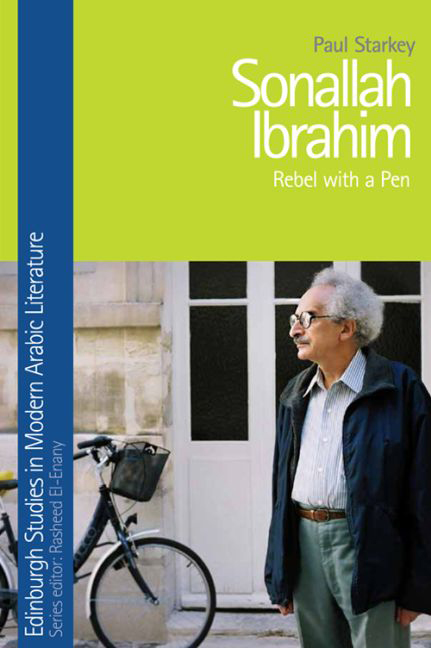Book contents
- Frontmatter
- Contents
- Series Editor's Foreword
- Preface
- 1 Introduction: Background and Context
- 2 Rebel with a Pen
- 3 Cairo Prison: Tilka al-raʾiha (1966)
- 4 Michelangelo and the Dam: Najmat Aghustus (1974)
- 5 CocaColaland: al-Lajna (1981)
- 6 War in Lebanon: Bayrut, Bayrut (1984)
- 7 Consumer Society: Dhat (1992)
- 8 Prison of Dishonour: Sharaf (1997)
- 9 Widening Horizons (1): Sex, Memory and Revolution: Warda (2000)
- 10 Widening Horizons (2): In the Land of the Capitalists: Amrikanli (Amri Kan Li) (2003)
- 11 Return to Childhood: al-Talassus (2007)
- 12 The French Connection: al-ʿImama wa-al-Qubbaʿa (2008) and al-Qanun al-Faransi (2008)
- 13 Filling a Gap: al-Jalid (2011)
- 14 Epilogue
- Bibliography
- Index
9 - Widening Horizons (1): Sex, Memory and Revolution: Warda (2000)
Published online by Cambridge University Press: 23 September 2017
- Frontmatter
- Contents
- Series Editor's Foreword
- Preface
- 1 Introduction: Background and Context
- 2 Rebel with a Pen
- 3 Cairo Prison: Tilka al-raʾiha (1966)
- 4 Michelangelo and the Dam: Najmat Aghustus (1974)
- 5 CocaColaland: al-Lajna (1981)
- 6 War in Lebanon: Bayrut, Bayrut (1984)
- 7 Consumer Society: Dhat (1992)
- 8 Prison of Dishonour: Sharaf (1997)
- 9 Widening Horizons (1): Sex, Memory and Revolution: Warda (2000)
- 10 Widening Horizons (2): In the Land of the Capitalists: Amrikanli (Amri Kan Li) (2003)
- 11 Return to Childhood: al-Talassus (2007)
- 12 The French Connection: al-ʿImama wa-al-Qubbaʿa (2008) and al-Qanun al-Faransi (2008)
- 13 Filling a Gap: al-Jalid (2011)
- 14 Epilogue
- Bibliography
- Index
Summary
Sonallah Ibrahim's next full-length novel, Warda, published in 2000, continued the trend established in several of the author's previous works of merging a clearly fictional ‘frame’ narrative with real or fictional documents of one sort or another, a technique for which the term ‘docu-fiction’ has sometimes been used. The mixture of fact and fiction is explicitly acknowledged by the author in a statement preceding the text, which concludes that: ‘for this reason, they [i.e. the following pages] are better read as … fiction’. The work also continued a line of development established in Bayrut, Bayrut, in that it was set largely outside Egypt, though despite certain similarities with the earlier work, it represents a considerably more complex literary endeavour than Bayrut, Bayrut, both structurally and in geographical terms. Like many of the author's previous novels, the work – which is an attempt to portray and understand the so-called Dhofar rebellions of the 1960s and early 1970s – is the product of a considerable amount of original research. The subject matter may strike some as surprising, for notwithstanding Nasser's intervention in Yemen, the history of the southern part of the Arabian Peninsula during that period had not been (and, one may confidently say, is still not) a subject of major interest to most Egyptian intellectuals, let alone the general population; the choice of subject may therefore be taken as another example of the author's determination to follow his own path rather than be swayed by current trends and fashions.
Sonallah Ibrahim himself described the book as ‘an attempt to understand what happened over 30 years throughout the entire region’, and as the product of ‘five entire years [of] reading and meeting people and looking for anything, however small, about the [Omani] Êufār revolutionaries’, adding that, in attempting to recapture the events of the politically charged atmos-phere of the late 1950s and early 1960s – events through which he himself had lived – he had tried to avoid becoming nostalgic.
- Type
- Chapter
- Information
- Sonallah IbrahimRebel with a Pen, pp. 136 - 154Publisher: Edinburgh University PressPrint publication year: 2016



